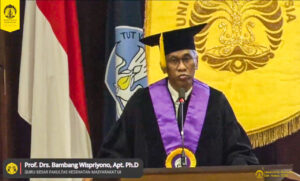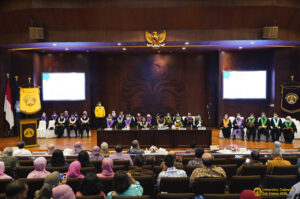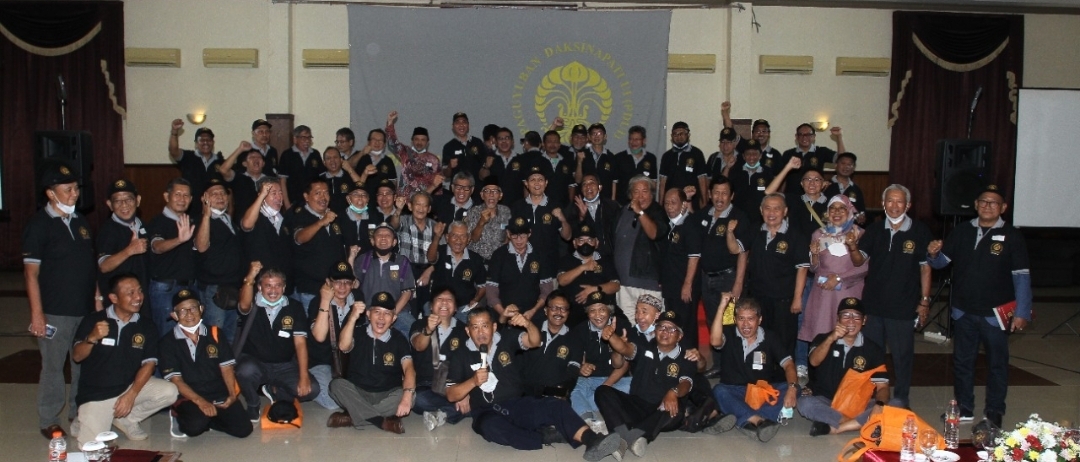
PROFESSOR OF FKM UI BREAKS FAKTA IDEAS TO FACE GLOBAL HEALTH AND ENVIRONMENTAL CHANGES
The environmental health aspect becomes a necessity to be considered in a government policy in the attempt to develop the economy and human growth. By paying attention to this, human productivity can be kept away from diseases that originate from the environment. Environmental health is not only limited to making the environment clean, but with a broad understanding and interconnectedness between disciplines.
An environment that is poorly operate can trigger a deterioration in the quality of human life, especially with humans who are not healthy. This can also indirectly trigger political instability and unity, thus potentially causing conflict. If that happens, it will be counterproductive to development (Hendrix and Salehyan, 2012; Kelley et al., 2015; Watts et al., 2015).
“Globalization and various global health challenges demand the development of environmental health sciences. One of them is realizing a new environmental health paradigm according to global conditions as evidenced by current environmental health issues,” said Prof. Drs. Bambang Wispriyono, Apt. Ph.D., while delivering his inaugural speech as a Professor at the Faculty of Public Health, University of Indonesia (FKM UI), on Wednesday (30/11), at the UI Depok Campus.
Looking at the conditions of these various global health challenges, Prof. Bambang gave birth to ideas in the form of FACTS (Focus, Direction, Needs, Challenges and Actions) to summarize a new environmental health paradigm, in the face of environmental change and global health. The first point in the idea is focus, which includes environmental health sciences. In the concept of environmental health, the quality of health that must be maintained is human beings, by taking care of factors originating from the environment. The importance of human health is the key to the productivity it carries out, because a person can contribute to the development around him.
He said, environmental health must also be in accordance with the direction of environmental health in the global paradigm. Environmental health has a need in assessing environmental health aspects and the competence of qualified environmental health workers. In addition, environmental health also faces challenges related to involving key actors to internalize the new paradigm, with an emphasis on strengthening cooperative relations between environmental health professional associations and associations of environmental health educational institutions.
To face this challenge, Prof. Bambang emphasized that action is needed in the form of strategic steps, namely strengthening and updating regulations and policies, strengthening resource management, and strengthening data digitalization governance. At the end of his speech, Prof. Bambang also hopes that the development of environmental health in Indonesia will improve in a better direction in the future. A well-maintained environment can maintain public health and then maintain political stability, security and national unity

The inauguration procession of Prof. Bambang is led by the Rector of UI, Prof. Ari Kuncoro, S.E., M.A., Ph.D., live at the Convention Center, UI Campus, Depok, and broadcast virtually via the UI TV Youtube channel. Among the invited guests was the Chancellor of Respati Indonesia University, Prof. Dr. drg. Tri Budi Wahyuni Raharjo, MS.; Hasanuddin University FKM Dean, Prof. Sukri Palutturi, SKM, M.Kes., MSc. PH, Ph.D.; JICA Expert on Environmental Policy, Ministry of Environment, Prof. Koji Arizono, Ph.D.; Director of Public Health and Nutrition of the Ministry of National Development Planning/Bappenas, Pungkas Bahjuri Ali, S.TP, MS, Ph.D.; Chairman of the Association of Indonesian Dentists (PDGI) drg. Usman Sumantri M.Sc.; Main Director of PT Tirta Asasta Depok, Muhammad Olik Abdul Holik, Ak., M.Sc.; Chairman of IKKESINDO Dr. Suprijantoro, Sp.P, MARS.; and Chairman of the National Sharia Council of the Indonesian Ulema Council, Dr. KH. Hasanudin, M.Ag.
Prof. Bambang is a member of the UI Academic Senate and Chair of the FKM UI Academic Senate who currently also serves as Chair of the FKM UI Center for Environmental and Industrial Health Studies. In addition, he served as Dean of FKM UI in 2008-2013. He completed his Bachelor of Pharmacy education at the Faculty of Mathematics and Natural Sciences (FMIPA) at the University of Indonesia in 1991.
Still at the same faculty and campus, he graduated from the pharmacist profession program in 1992. Prof. Bambang managed to get a Ph.D in Environmental Toxicology from the Dept. of Environmental Toxicology, Institute of Industrial and Ecological Science, University of Occupational and Environmental Health, Kitakyushu, Japan.
Several titles of scientific works in the area of study of public health science, including Made Djaja, Instrument Development to Measure the Medical Waste Management Performance in Healthcare Centers Bandung (2022), The Role of Hygiene and Sanitation to The Escherichia coli Contamination in Drinking Water in Depok City ( 2021), The Human Health Risk of Cadmium (Cd), Mercury (Hg), and Lead (Pb) Exposure in The Upper Citarum River Basin, West Java, Indonesia (2021), Glutathione (GSH) and Superoxide Dismutase (SOD) Levels Among Junior High School Students Induced by Indoor Particulate matter 2.5 (PM2.5) and Nitrogen dioxide (NO2) Exposure (2021), and The Distributions of Microplastics (MPs) in The Citarum River Basin, West Java, Indonesia (2021).



